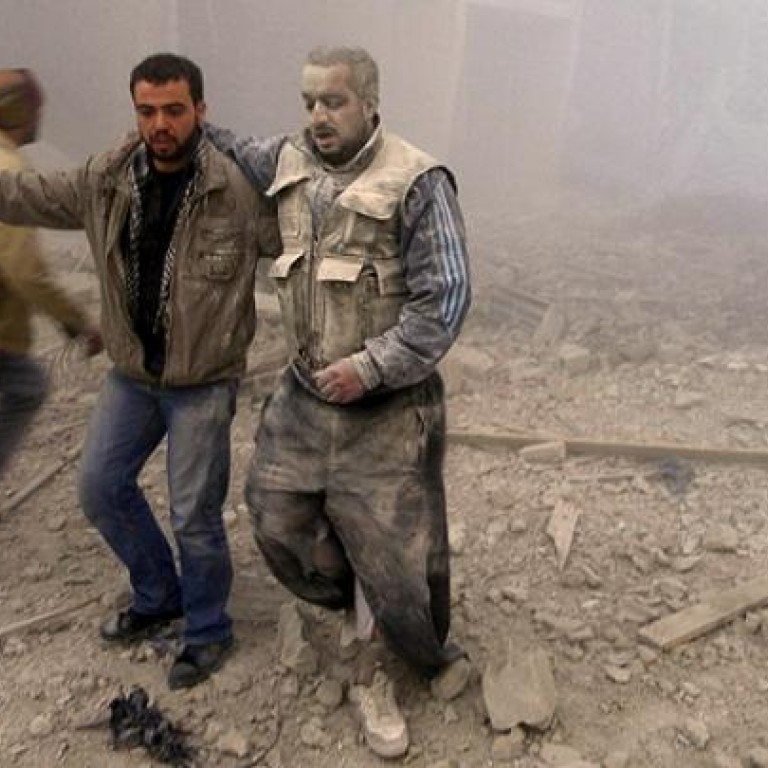
Syrian army pounds Damascus rebel districts
Syrian government forces bombarded rebel districts near Damascus on Tuesday in a counter-attack to stem rebel gains around President Bashar al-Assad’s power base.
Syrian government forces bombarded rebel districts near Damascus on Tuesday in a sustained counter-attack to stem rebel gains around President Bashar al-Assad’s power base.
The fighting around Damascus has led foreign airlines to suspend flights and prompted the United Nations and European Union to reduce their presence in the capital, adding to a sense that the fight is closing in.
The army fightback came a day after the Syrian foreign ministry spokesman was reported to have defected in a potentially embarrassing blow to the government.
The Syrian Observatory for Human Rights said 200 people were killed across Syria on Monday, more than 60 of them around Damascus. Assad’s forces bombarded districts to the south-east of the capital on Tuesday, near to the international airport, and in the rebel bastion of Daraya to the south-west.
In central Damascus, shielded for many months from the full force of a civil war in which 40,000 people have been killed, one resident reported hearing several loud explosions.
“I have heard four or five thunderous blows. It could be barrel bombs,” she said, referring to makeshift bombs which activists say Assad’s forces have dropped from helicopters on rebel-dominated areas.
The mainly Sunni Muslim rebel forces have made advances in recent weeks, seizing military bases, including some close to Damascus, from forces loyal to Assad, who is from Syria’s Alawite minority linked to Shi’ite Islam.
Faced with creeping rebel gains across the north and east of the country, and the growing challenge around the capital, Assad has increasingly resorted to air strikes against the insurgents.
Amid talk that troops had also moved chemical weapons, US President Barack Obama again warned Assad against using them.
The Foreign Ministry in Damascus said on Monday it would never use chemical weapons against Syrians. The statement was issued by an unnamed ministry source after the disappearance of spokesman Jihad Makdissi.
A diplomat in the Middle East said Makdissi had left the country and defected, while the British-based Observatory said it had information that he flew from Beirut on Monday afternoon heading for London.
In Beirut, a diplomat said Lebanese officials had confirmed that Makdissi spent several days in Beirut before leaving on Monday, but could not confirm his destination.
“We’re aware of reports that he has defected and may be coming to the UK. We’re seeking clarification,” a Foreign Office spokeswoman in London said.
Makdissi was the public face to the outside world of Assad’s government as it battled the 20-month-old uprising. But he had barely appeared in public for several weeks before Monday’s report of his defection.
He had little influence in a system largely run by the security apparatus and the military. But Assad’s opponents will see the loss of such a high profile figure, if confirmed, as further evidence of a system crumbling from within.
The United Nations and European Union both said they were reducing their presence in Syria in response to the escalated violence around the capital.
A spokesman for UN humanitarian operations said the move would not stop aid deliveries to areas which remained accessible to relief convoys.
“UN-funded aid supplies delivered through SARC (Syrian Arab Red Crescent) and other charities are still moving daily where the roads are open,” Jens Laerke told reporters in Geneva.
“We have not suspended our operation, we are reducing the non-essential international staff.”
Three remaining international staff at the European Union delegation, who stayed on in Damascus after the departure of most Western envoys, crossed the border into Lebanon on Tuesday after pulling out of the Syrian capital.
An EU official said they would move to Brussels or Beirut.
The Syrian army appears to have focused most of its energy on Damascus, where rebels have been planning to push into the capital from the surrounding suburbs.
Neither side appears to have the upper hand in the fighting and a previous attempt by rebels last July to hold ground in the city was crushed as the fighters fell back into the suburbs and nearby countryside.
Clashes continued around Damascus International Airport and along the airport highway, which has become an on-and-off battleground that forced foreign airlines to suspend flights to Damascus since Thursday evening.
EgyptAir, which tried to resume flights on Monday, had to call back a plane headed to Damascus due to the “bad security situation” around the airport, an airline official said.
Media reports citing European and US officials said Syria’s chemical weapons had been moved and could be prepared for use in response - a fear raised by the opposition.
White House spokesman Jay Carney said US concerns about Syria’s intentions regarding the use of chemical weapons were increasing, prompting Washington to make contingency plans.
Obama, who has steered clear of repeating in Syria the kind of military engagements Washington has seen in Iraq, Afghanistan or Libya, later repeated a warning to Assad - vaguely worded - against using chemical weapons to keep himself in power:
“The world is watching,” Obama said. “The use of chemical weapons is and would be totally unacceptable and if you make the tragic mistake of using these weapons there will be consequences and you will be held accountable.”
